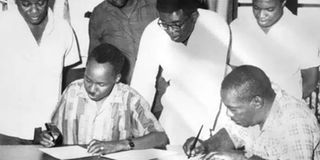Zanzibar elders share the true state of the Union

What you need to know:
- Tanzania was born on April 26, 1964, after then-leaders Mwalimu Julius Nyerere of Tanganyika and Sheikh Abeid Amani Karume of Zanzibar symbolically mixed soil from both territories
Unguja. As Tanzania commemorates 61 years of Tanganyika and Zanzibar’s unification, elders on Unguja Island say the Union has brought substantial benefits to the people and must therefore be safeguarded with unwavering commitment.
Tanzania was born on April 26, 1964, after then-leaders Mwalimu Julius Nyerere of Tanganyika and Sheikh Abeid Amani Karume of Zanzibar symbolically mixed soil from both territories, marking the formation of the United Republic of Tanzania.
Although minor challenges persist and fuel uncertainty among some, the elders stress the importance of addressing such issues through established mechanisms to ensure both sides benefit equitably from the Union.
Mwalimu Nyerere, who led Tanganyika to independence from British colonial rule in 1961, laid the groundwork for the Union alongside Sheikh Karume, the first President of Zanzibar following the 1964 Revolution.
Zanzibar—comprising Unguja and Pemba islands—joined Tanganyika three months after the revolution to form a single sovereign nation.
Voices of the elders
As part of the 61st Union anniversary, elders in Unguja say the Union is a historical and cultural treasure that must be preserved in line with the vision of its founding leaders, even though they are no longer alive.
Mzee Abubakar Haji Bobea, who once served as a writer for President Karume, says both governments are currently operating effectively and that today’s leaders demonstrate clear commitment to managing Union matters with care and inclusivity.
“There is a strong commitment to managing Union affairs. No sound-minded leader would wish to see this Union collapse. We’ve come a long way and seen its benefits. We must take it to the end,” says Mr Bobea.
Despite the progress, Mr Bobea, who has held various government roles, acknowledges that challenges remain, particularly around trade relations between the mainland and Zanzibar.
He notes that Zanzibar is economically smaller and depends heavily on the Tanzanian mainland for markets, yet regulatory and legal hurdles continue to limit the free flow of goods, particularly affecting low-income citizens.
“Zanzibaris are naturally warm and hospitable. But when someone travels to Dar es Salaam from Zanzibar carrying a gift or a television, they still have to pay tax. It’s a hardship for ordinary citizens,” he explains.
He adds that travellers from the mainland bringing small items like cashew nuts to Zanzibar also face taxation, creating resentment and undermining the spirit of the Union.
“These are issues that require thoughtful reflection, because the Union should embody genuine love and unity,” he says.
Minister of State in the President’s Office (Policy, Coordination, and the House of Representatives), Mr Hamza Hassan Juma, says the Union has brought notable advantages to Zanzibar, including improved access to services and shared development initiatives.
“I’m baffled by those who say the Union offers no benefits. It has enabled many joint achievements. The government remains committed to upholding it and tackling any challenges that emerge, in line with the founders’ vision,” he states.
Mzee Omar Mohamed Said insists that the Union is a political arrangement and a deep-rooted social and economic bond.
“Let’s be honest. When you examine it closely, the Union is incredibly important, except for those with personal interests. They’re the ones who downplay its value,” he says.
He urges senior leaders from both sides to regularly meet and resolve any areas of tension to ensure smooth functioning.
“No system is flawless, but we’ve made great strides. People interact more, and trade has improved,” he adds.
“Those advocating for the Union’s dissolution likely have self-serving motives, not national interests. It’s vital to keep educating younger generations on the Union’s history and significance. The Union is life—nothing compares,” he insists.
Mzee Haji Shaibu Hamad echoes the need to preserve peace and unity while strengthening the Union by constructively addressing emerging concerns.
“The Union has brought major gains for both sides. It’s also important to explore a Union structure that’s mutually acceptable, because no country can succeed in isolation. The Union should bring shared satisfaction,” he says.
He maintains that the Union presents tremendous opportunities for all Tanzanians, but insists that Zanzibar must receive equal access to development initiatives.
“What’s rolled out on the mainland should also happen in Zanzibar. That shows a cohesive national direction. If the Union collapsed, even our security could be threatened—Zanzibar is an island and more vulnerable to external threats,” he warns.
Mzee Muhidini Muhidin, a retired officer of the Tanzania People’s Defence Force (TPDF), says the Union has greatly enhanced professionalism and experience-sharing among government officials from both sides.





